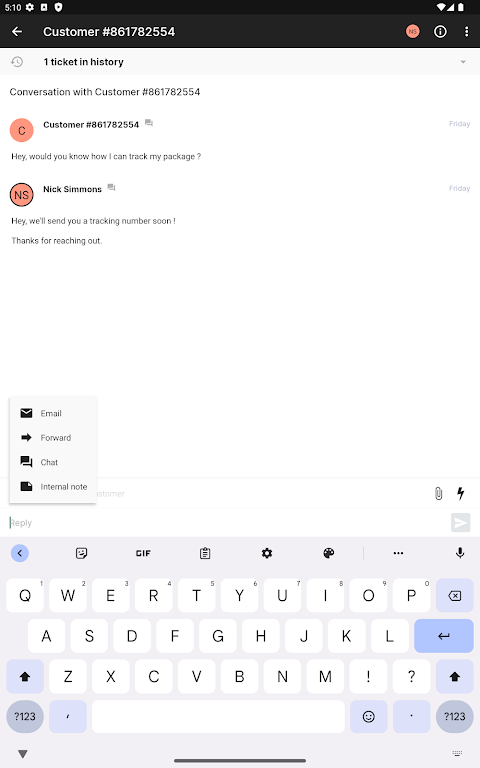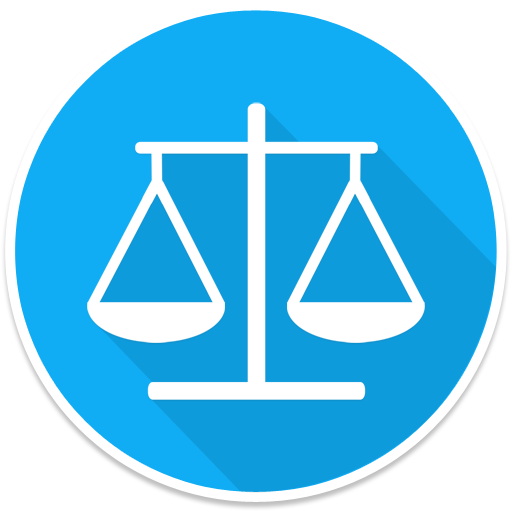The Gorgias mobile application gives you access to a true all-in-one help desk experience while at the office or on-the-go. View and respond to email, live chat, phone, Facebook, Instagram, contact us page through one unified, mobile platform so you can streamline your support tickets, saving you time and money.
From our mobile app, you can:
Provide Customer Service On Every CRM Channel
- Manage conversations from email, live chat, phone, and social in one helpdesk
- See the full customer live chat and message history across different channels in one view
- Provide support for multiple stores
Cut Customer Support Time In Half
- Respond instantly with live chat
- See customer support details and orders right next to the ticket
- Respond in one click using pre-made templates
- Use Macros (variables like order status, shipping date, etc.) to pre-fill answers
Gorgias is a help desk (help center or customer support) for Ecommerce stores that allows your customer service team to manage all of your support, customer service in one place. Top Shopify and Magento stores use Gorgias to reduce ticket first response time and increase the efficiency of their customer support teams.
Introduction:
Gorgias is a Platonic dialogue that explores the nature of rhetoric, its relationship to justice, and the ethical implications of using rhetoric for persuasion. Socrates, the main protagonist, engages in a series of conversations with Gorgias, a renowned rhetorician, and his student Polus.
Gorgias' Definition of Rhetoric:
Gorgias defines rhetoric as the art of persuasion, capable of influencing any audience, regardless of their knowledge or experience. He believes rhetoric is a powerful tool that can be used to achieve political power, wealth, and social status.
Socrates' Critique of Gorgias' Definition:
Socrates challenges Gorgias' definition, arguing that rhetoric is not merely about persuasion but also about the pursuit of truth and justice. He distinguishes between true rhetoric, which aims to educate and improve the audience, and false rhetoric, which employs deceptive tactics to manipulate and exploit.
The Relationship between Rhetoric and Justice:
Socrates maintains that rhetoric and justice are inherently intertwined. True rhetoric should serve the cause of justice by promoting truth, reason, and the common good. False rhetoric, on the other hand, undermines justice by fostering ignorance, deception, and self-interest.
Polus' Defense of Rhetoric:
Polus, Gorgias' student, defends rhetoric by arguing that it is essential for political life. He claims that even if rhetoric can be used for unjust purposes, it is ultimately a neutral tool that can be used for both good and evil.
Socrates' Response to Polus:
Socrates counters Polus' argument by asserting that the pursuit of political power and wealth should not be the primary goal of rhetoric. True justice, he believes, requires a commitment to virtue and the common good, not mere persuasion.
Callicles' Intervention:
Callicles, a wealthy and influential Athenian, interrupts the conversation and challenges Socrates' view of justice. He argues that justice is merely a social construct designed to protect the weak from the strong. True justice, according to Callicles, is the right of the strong to dominate the weak.
Socrates' Refutation of Callicles:
Socrates refutes Callicles' argument by demonstrating the self-destructive nature of his philosophy. He argues that injustice ultimately leads to unhappiness and that true happiness can only be found in living a just and virtuous life.
Conclusion:
Gorgias concludes with Socrates reaffirming his belief in the importance of true rhetoric, which seeks to promote truth, justice, and the common good. He argues that rhetoric should be used as a tool for enlightenment and ethical persuasion, not for manipulation and exploitation.
The Gorgias mobile application gives you access to a true all-in-one help desk experience while at the office or on-the-go. View and respond to email, live chat, phone, Facebook, Instagram, contact us page through one unified, mobile platform so you can streamline your support tickets, saving you time and money.
From our mobile app, you can:
Provide Customer Service On Every CRM Channel
- Manage conversations from email, live chat, phone, and social in one helpdesk
- See the full customer live chat and message history across different channels in one view
- Provide support for multiple stores
Cut Customer Support Time In Half
- Respond instantly with live chat
- See customer support details and orders right next to the ticket
- Respond in one click using pre-made templates
- Use Macros (variables like order status, shipping date, etc.) to pre-fill answers
Gorgias is a help desk (help center or customer support) for Ecommerce stores that allows your customer service team to manage all of your support, customer service in one place. Top Shopify and Magento stores use Gorgias to reduce ticket first response time and increase the efficiency of their customer support teams.
Introduction:
Gorgias is a Platonic dialogue that explores the nature of rhetoric, its relationship to justice, and the ethical implications of using rhetoric for persuasion. Socrates, the main protagonist, engages in a series of conversations with Gorgias, a renowned rhetorician, and his student Polus.
Gorgias' Definition of Rhetoric:
Gorgias defines rhetoric as the art of persuasion, capable of influencing any audience, regardless of their knowledge or experience. He believes rhetoric is a powerful tool that can be used to achieve political power, wealth, and social status.
Socrates' Critique of Gorgias' Definition:
Socrates challenges Gorgias' definition, arguing that rhetoric is not merely about persuasion but also about the pursuit of truth and justice. He distinguishes between true rhetoric, which aims to educate and improve the audience, and false rhetoric, which employs deceptive tactics to manipulate and exploit.
The Relationship between Rhetoric and Justice:
Socrates maintains that rhetoric and justice are inherently intertwined. True rhetoric should serve the cause of justice by promoting truth, reason, and the common good. False rhetoric, on the other hand, undermines justice by fostering ignorance, deception, and self-interest.
Polus' Defense of Rhetoric:
Polus, Gorgias' student, defends rhetoric by arguing that it is essential for political life. He claims that even if rhetoric can be used for unjust purposes, it is ultimately a neutral tool that can be used for both good and evil.
Socrates' Response to Polus:
Socrates counters Polus' argument by asserting that the pursuit of political power and wealth should not be the primary goal of rhetoric. True justice, he believes, requires a commitment to virtue and the common good, not mere persuasion.
Callicles' Intervention:
Callicles, a wealthy and influential Athenian, interrupts the conversation and challenges Socrates' view of justice. He argues that justice is merely a social construct designed to protect the weak from the strong. True justice, according to Callicles, is the right of the strong to dominate the weak.
Socrates' Refutation of Callicles:
Socrates refutes Callicles' argument by demonstrating the self-destructive nature of his philosophy. He argues that injustice ultimately leads to unhappiness and that true happiness can only be found in living a just and virtuous life.
Conclusion:
Gorgias concludes with Socrates reaffirming his belief in the importance of true rhetoric, which seeks to promote truth, justice, and the common good. He argues that rhetoric should be used as a tool for enlightenment and ethical persuasion, not for manipulation and exploitation.












